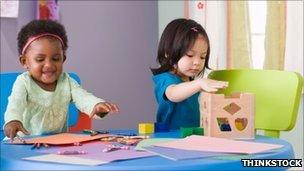Early years development measures to be scaled back
- Published
Dame Clare Tickell: "It is incredibly important to put in high-quality childcare early on for children"
A simpler, less bureaucratic system for assessing how young children in England are developing has been recommended.
The Early Years Foundation Stage, which currently has 69 benchmarks, will be reduced to just 17, focusing on basics like physical development and language.
This foundation stage sets out targets for learning and welfare for childcare providers.
But there has been criticism that it makes carers spend more time ticking boxes and less time with children.
A review of the early years framework - sometimes dubbed the "nappy curriculum" - was commissioned by the government in July.
It was carried out by Dame Clare Tickell, chief executive of Action for Children, who published her recommendations on Wednesday.
Less bureaucratic
The current requirements for this early years age group can be "cumbersome, repetitive and unnecessarily bureaucratic," said Dame Clare.
But her review backs the principle of keeping this foundation stage for young children.
"The earliest years in a child's life are absolutely critical. Next to a loving and stable home environment, high quality early years education is one of the most important factors in a child's development," she said.
The review calls for the list of learning goals to be slimmed down to focus on three key areas - personal, social and emotional development; communication and language; and physical development.

The new foundation stage will focus on 17 core areas of development in the pre-school years
There are also recommendations for four areas of learning - "literacy, mathematics, expressive arts and design and understanding the world".
And it calls for parents to be given a summary of their child's development at the age of two which would provide an early warning of any problems.
It also promises to remove red tape - which will include the end of the requirement for written risk assessments for trips and outings.
Popular with parents
But Dame Clare said the consultation process had shown that the idea of the foundation stage for learning for this age group was popular with parents and childcare providers.
"They feel it's given them a narrative and an understanding of child development," she told BBC Radio 4's Today programme.
"But the way it is interpreted encourages us to spend more time filling in pieces of paper when actually what we want to do is to spend time with children," she said.
"My intentions have been to make it higher quality and smaller. What's really important is to build on what is a very successful framework, but to make it simpler and accessible to parents."
NAHT general secretary, Russell Hobby, said head teachers would be "very pleased", both that the framework was being retained and that it was being slimmed down.
The Association of Teachers and Lecturers said it wanted to see recommendations about what schools should do to be ready for early years children - and warned about cuts to services for this age group.
"We are appalled that cuts to local services are putting children's centres and other early years provision under threat," said general secretary, Mary Bousted.
The National Union of Teachers also welcomed the cutting in bureaucracy - but warned against the backdrop of funding cuts.
"Reducing from 69 to 17 the benchmarks for young children is a victory for common sense. The EYFS had become a bureaucratic nightmare," said general secretary, Christine Blower.
"Cuts to local authority budgets are threatening the very existence of children's centres and early years provision. This is an appalling situation which will simply lead to an increase in social disadvantage. If the government is serious about addressing inequality it needs to rethink its cuts agenda."
Kate Groucutt, policy director at Daycare Trust, said she supported moves to simplify the foundation stage - believed that "every child's early education must be continued to be delivered within this framework".
"In particular we welcome the review's emphasis on making the EYFS more accessible to parents, and providing development summaries to parents when their child is two years old."
- Published15 October 2010
- Published8 November 2010